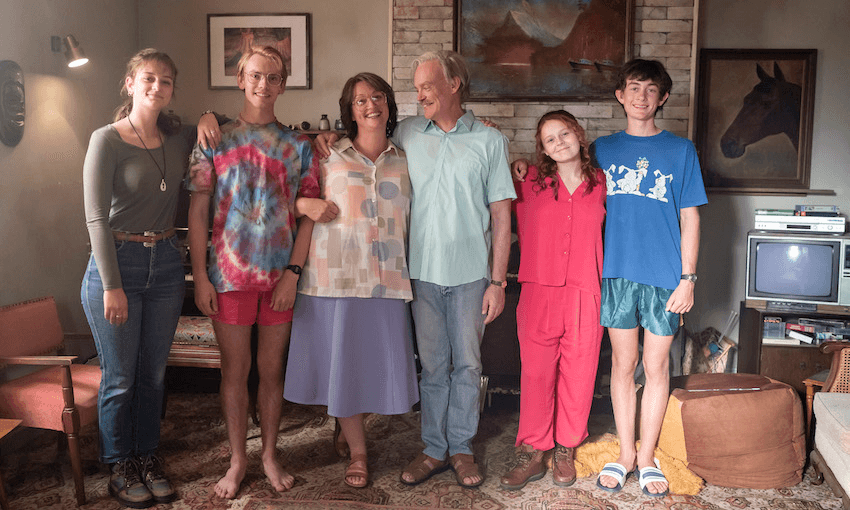Black Hands, adapted from the podcast of the same name, doesn’t do the Bain family justice, writes Sam Brooks.
“Dunedin
20th June, 1994
5 members of the Bain family were shot dead in their home.”
That blunt piece of text precedes the opening credits of every episode of TVNZ’s Black Hands, adapted from the hugely successful Stuff podcast of the same name. Chances are most New Zealanders don’t need the second part of the text, though. We know what happened on the 20th June in 1994, or as much as we can know. More fights have been had over what did or did not happen that morning than over who runs our country.
The Bain family murders are, without a doubt, our country’s most famous unresolved murder, and it’s a case that can reignite passionate arguments even decades later. The same probably can’t be said for this five-part dramatisation of the story, which barely raises an argument for its own existence, let alone either side of the Bain case. If you’re unclear on what those sides are, the series states it clearly after the opening credits by quoting the Privy Council in the case’s 2007 retrial: “Who did it? David Bain? Robin Bain?”.
Unlike the podcast, which focused on the many trials (legal and otherwise) of David Bain, this adaptation, directed by David Stubbs and written by NZ drama stalwart Gavin Strawhan, hones in on the family and their murders. It opens with two Dunedin policemen receiving that infamous 111 call, and then visiting the scene of the crime. We see the Bain family dead before we ever see them alive, a grisly reminder of how the vast majority of the country were introduced to them.
From there, the series settles into a rhythm: episodes are bookended by the morning of the murders, with the bulk of each hour focusing on the family in the years leading up to that morning. We see David’s university days, and his dysfunctional relationship with his father Robin, a school teacher, and his mother, Margaret, a God-loving, Satan-fearing homemaker with delusions of comfort, if not grandeur. His relationships with his siblings – Arawa, Laniet and Stephen – are no less complicated, but less tortured, and they take a backseat in this adaptation.
Black Hands is handsomely made, to the point of distraction. It’s shot beautifully, using every particle of Dunedin fog to its moody benefit, and the score is full of disconcerting, discordant strings. The problem here is the Bain family doesn’t get the chance to be anything more than “the Bain family” from the headlines; they’re more scandal than human. As characters, they live with the spectre of their tragic murders hanging over them, with every bleakly under-lit shot of them around the kitchen table – soundtracked by a sole, screeching violin – telling us that yes, this family, sans David, ends up dead. It suffocates the series, and the characters: they’re not people, they’re victims.
The cast fight valiantly against this suffocation, trying to go deeper than what the script gives them. Richard Crouchley has a curious challenge as David Bain. As Black Hands presents him, David is a peculiar person with bizarre vocal tics and strange responses to situations; he overreacts to perceived slights, and expresses himself in idioms just left enough of centre to be unnerving. Crouchley is convincing, even chilling, as David, but the series structure gives him little to work with: He has to be the Bain we all know from the very start, rather than growing into that sweater-wearing man as the story progresses.
In many ways, Black Hands feels like the natural endpoint for that Sunday mainstay of New Zealand television: the prestige dramatisation of news events that gripped the nation and wouldn’t let go. These films and limited series always have decent production values and great actors, but tend to avoid presenting a strong take on the events. The “based on a true story” genre isn’t the easiest to do well. It’s difficult to set out the necessary facts in a comprehensive way, while also telling a nuanced, compelling story.
New Zealand television has already given itself a lot of chances to get it right (and succeeded at times, like with last year’s Runaway Millionaires), but eventually we’re going to run out of true-life stories to tell, especially if these dramas continue to focus on notable Pākehā New Zealanders. Our country’s commissioning commitment to these series is doing nobody any favours: not the film-makers, not the audiences, and really, not the stories themselves.
Back to Black Hands, and back to the Bains, though: what do we, as an audience, get from this adaptation that we don’t already have at our fingertips already? The podcast is there, as are many brilliant pieces of writing about the murders and subsequent legal wrangling. This isn’t a story in need of being unearthed or retold. Families have been debating this, both idly and passionately, for decades. No matter how handsome the film-making or how committed the actors, Black Hands doesn’t bring any extra insight to the Bain murders. Even worse, it flattens out a family of real people into caricatures. Even in death, the Bains deserve better.
Black Hands starts tonight and airs weekly on TVNZ1 at 8.30pm. Two episodes were watched for review.



